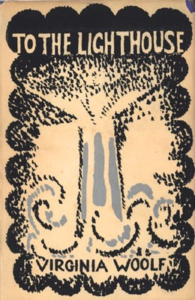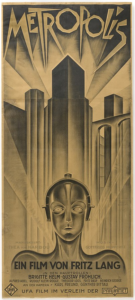On January 1, 2023, copyrighted works from 1927 entered the US public domain. They are now free for all to copy, share, and build upon. These include Virginia Woolf’s To The Lighthouse and the final Sherlock Holmes stories by Arthur Conan Doyle, the German science-fiction film Metropolis and Alfred Hitchcock’s first thriller, compositions by Louis Armstrong and Fats Waller, and a novelty song about ice cream.
Here are just a few of the works that will be in the US public domain in 2023. There is a lot to celebrate: a modernist masterpiece, poetry from the Harlem Renaissance, children’s verses featuring Winnie-the-Pooh and other characters, and early works from Hemingway and Faulkner.
Books

First edition cover, designed by the author’s sister Vanessa Bell (1927). Image in the public domain.
- Virginia Woolf, To the Lighthouse
- Arthur Conan Doyle, The Case-Book of Sherlock Holmes
- Willa Cather, Death Comes for the Archbishop
- Countee Cullen, Copper Sun
- A. A. Milne, Now We Are Six, illustrations by E. H. Shepard
- Thornton Wilder, The Bridge of San Luis Rey
- Ernest Hemingway, Men Without Women (collection of short stories)
- William Faulkner, Mosquitoes
- Agatha Christie, The Big Four
- Edith Wharton, Twilight Sleep
- Herbert Asbury, The Gangs of New York (the original 1927 publication)
- Marcel Proust, Le Temps retrouvé (the final installment of In Search of Lost Time, in the original French)
Movies
1927 marked the beginning of the end of the silent film era, with the release of the first full-length feature with synchronized dialogue and sound. (Please note that while the original footage from these films will be in the public domain, newly added material such as musical accompaniment might still be copyrighted. If a film has been restored or reconstructed, only original and creative additions are eligible for copyright; if a restoration faithfully mimics the preexisting film, it does not contain newly copyrightable material.)
- Metropolis (directed by Fritz Lang)
- The Jazz Singer (the first feature-length film with synchronized dialogue; directed by Alan Crosland)
- Wings (winner of the first Academy Award for outstanding picture; directed by William A. Wellman)
- The Lodger: A Story of the London Fog (Alfred Hitchcock’s first thriller)
- The King of Kings (directed by Cecil B. DeMille)
- London After Midnight (now a lost film; directed by Tod Browning)
- 7th Heaven (inspired the ending of the 2016 film La La Land; directed by Frank Borzage)
- The Kid Brother (starring Harold Lloyd; directed by Ted Wilde)
- The Unknown (directed by Tod Browning)
Music
This year’s musical line-up includes Broadway hits, early blues songs, jazz standards, and more. Only the musical compositions—the music and lyrics that you might see on a piece of sheet music—are entering the public domain, not the recordings of those songs, which are covered by a separate copyright. Last year, decades of sound recordings made from the advent of recording technology through the end of 1922 went into the public domain. This year no sound recordings are entering the public domain—for that, we will have to wait until January 1, 2024, when recordings from 1923 will become open for legal reuse.
- The Best Things in Life Are Free (George Gard De Sylva, Lew Brown, Ray Henderson; from the musical Good News)
- (I Scream You Scream, We All Scream for) Ice Cream (Howard Johnson, Billy Moll, Robert A. King)
- Puttin’ on the Ritz (Irving Berlin)
- Funny Face and ’S Wonderful (Ira and George Gershwin; from the musical Funny Face)
- Can’t Help Lovin’ Dat Man and Ol’ Man River (Oscar Hammerstein II, Jerome Kern; from the musical Show Boat)
- Back Water Blues, Preaching the Blues, Foolish Man Blues (Bessie Smith)
- Potato Head Blues, Gully Low Blues (Louis Armstrong)
- Rusty Pail Blues, Sloppy Water Blues, Soothin’ Syrup Stomp (Thomas Waller)
- Black and Tan Fantasy and East St. Louis Toodle-O (Bub Miley, Duke Ellington)
- Billy Goat Stomp, Hyena Stomp, Jungle Blues (Ferdinand Joseph Morton)
- My Blue Heaven (George Whiting, Walter Donaldson)
- Diane (Erno Rapee, Lew Pollack)
- Mississippi Mud (Harry Barris, James Cavanaugh)
Many of the works listed above were supposed to go into the public domain in 2003, after being copyrighted for 75 years. But before this could happen, Congress hit a 20-year pause button and extended their copyright term to 95 years. Now the wait is over—at least in the United States. On December 30, 2022, Canada froze its public domain for the next 20 years with its C-19 copyright law. Yes, that’s right, Canada is doing the same thing the US did in 1998, with all of the negative effects that have now been well documented. Professor Hal Abelson, the MIT computer scientist, once asked: “What does it mean to be human if we don’t have a shared culture? And what does a shared culture mean if you can’t share it?” On Public Domain Day, that act of grateful sharing begins for another year of our culture, something to celebrate indeed. Yet we should also spare a moment to regret that which we have lost.
This post was adapted by Emory Libraries’ Open Access Librarian Jennifer Townes from Public Domain Day 2023 (licensed CC BY 3.0) by Jennifer Jenkins, director of the Center for the Study of the Public Domain, Duke University School of Law.

